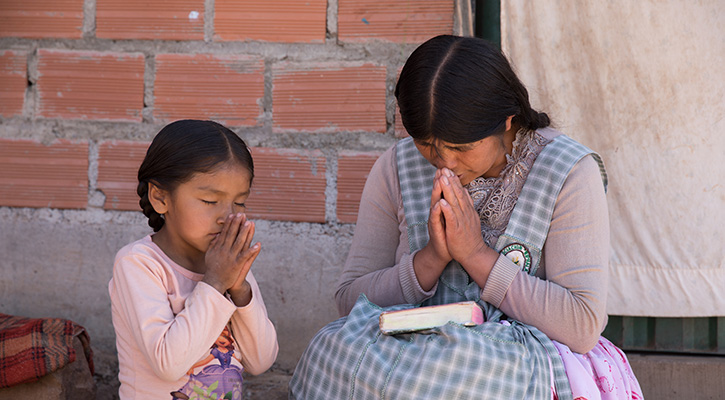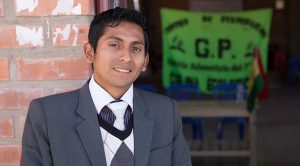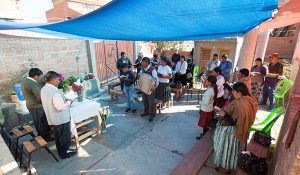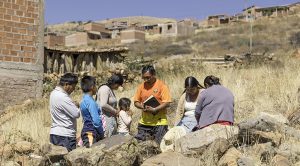
The music coming from the building was familiar. It was a song from her past, long before Daria Chipana had faced much heartbreak and loneliness–back when God had been a regular part of her life. And now, as she walked home, she couldn’t help but detour from her path and move toward the singing coming from the Colina Ecologica community center.
There, Chipana found people in worship. She stepped inside, looked around, then took a seat. That night, she heard the beautiful message of grace and love–things she had heard as a child, growing up and attending a Seventh-day Adventist school. She remembered going to worship with her mother. When her mother died, however, she transferred to a different school. Church visits became infrequent. When Daria got married, she quit church altogether.
‘I stopped going to church. Sometimes I would forget about the Lord. After that, I had two sons, and I became pregnant with my baby girl. Then my husband suffered an accident and died,’ says Chipana.
Chipana was alone. She had lived in La Paz, Bolivia, before moving to Cochabamba with her husband, years ago. Her family was far away, and her husband’s family had cast her aside. She worked long days in the marketplace, selling various items to provide for her children. Sometimes she made enough; other times the money was short. In her most desperate days, her thoughts grew dark.
‘Being both a father and mother to my children, I needed to provide for us,’ says Chipana. ‘I thought I would sell myself. But the children said, ‘Don’t provide for us like that.”
But now, she was sitting in a church, singing hymns and listening to the pastor preach about the Lord. She realized that even after all these years, God had never left her.
‘The pastor spoke of wonderful things. He said the Lord always takes good care of us,’ says Chipana. She saw this was true. In spite of everything, the Lord had been watching over her. ‘I’m always okay. My children are healthy…’
So night after night, Chipana returned to the meetings. By the end of the campaign, she was baptized.
Today, Chipana is one of 45 members of the Colina Ecologica Adventist church. During the week, she attends Bible studies. Sabbaths are spent worshipping in the morning, fellowshipping with her new friends at potluck, and helping with outreach.
‘I feel happy because the brethren are like brothers, sisters, and family members to me, so to speak,’ says Chipana. ‘It is such a great joy for me.’
The Problem of Growth
The evangelism meeting that drew Chipana back to church was organized by members of the Loma Linda congregation.
‘A small group of brothers from the church decided to take the initiative to evangelize an area close to where they lived,’ says Edsel Vivas, pastor for the Loma Linda District for the Adventist Church in the central part of Bolivia. ‘When we arrived in Colina Ecologica, we noticed a great need and thirst for the Gospel. So we started preaching. It was very well received, and thanks to the Lord, our brethren were very diligent, and people were very receptive to the Word of the Lord.’
Ramiro Condori was part of the team that helped to plant a new congregation in Colina Ecologica. He lives in the neighborhood, and he was eager to see the Adventist faith shared in the area.
‘This area has a growing population. Over the past five years, there has been much new construction taking place. Many brethren, like me, have come to live here,’ said Condori. He said he also noticed the influx of children with nothing to do on the weekends. ‘We are now seeing that parents are busier with their work. Almost 50 percent of the children who come here, their parents aren’t Adventists. We believe these children will grow and one day become part of the Adventist Church.’
This missionary spirit by the lay people is not uncommon in this part of Bolivia. In fact, it’s the reason why the Church is growing.
‘Brethren in the Adventist church in Bolivia are truly very simple people. However, they are also very spiritual people, and above all, very missionary-minded people,’ says Henrry Mendizabal, treasurer and director of Global Missions for the Adventist Church in Bolivia. ‘We can see brick masons, builders, farmers who get behind the pulpit on Saturdays and preach powerful sermons.’
‘It’s a church that is experiencing strong growth, and, above all, in recent years, we have seen the missionary spirit developing and advancing very strongly to reach people.’
There are nearly 120,000 Adventists in Bolivia. This number is expected to grow, and the church is facing a problem of space. There aren’t enough churches for all the congregations.
In the Cochabamba area, where Colina Ecologica is located, there are more than 18,000 members and 152 congregations. There are 60 groups that do not have a permanent place of worship. They meet in whatever space they can find–from carports to abandoned construction sites to sheds. Some congregations meet in homes, in driveways, or in borrowed spaces like a shed.
‘The Adventist Church has been growing significantly in Bolivia, which requires a greater need for resources. Everyday or every month, we have new places where preaching takes place. Now, through a very progressive approach, new pulpits are being open for preaching by going to new neighborhoods. This makes the construction of new temples a necessity,’ says Mendizabal.
Sadly, the congregations have little money. In Cochabamba, some groups have managed to save enough funds to purchase property, but they have no money left to build a structure.
‘As a church in Bolivia, we have approached Maranatha’s ministry to express our need for help in addressing the growth of our church,’ says Mendizabal. ‘It is a significant growth that we are unable to manage solely with our own resources.’
In 2017, Maranatha agreed to partner with the Adventist Church in Bolivia to provide churches. Construction was scheduled to begin in early 2018.
‘The new temples that Maranatha can build in Bolivia will not only impact our church–our church will be impacted in a very significant way, because many brethren who did not have a place to congregate will now be able to do so close to their families, close to the Christian community, in an environment or place to worship God,’ says Mendizabal. ‘It will also impact the community, the neighborhoods, and populations where the temples are built, because the very presence of the church in each neighborhood and community is what makes the difference.’
Answered Prayer
Colina Ecologica meets in a rented community center. It is a nice but public space, which can cause problems when there are conflicting events or objectives.
‘When you lease a place, there are always limitations,’ says Vivas. He says when there are conflicting events or objectives for the center, there can be tension or misunderstandings between the community and the church. ‘It isn’t too good for the church. Somehow it obstructs the road to evangelizing.’
‘The Word of the Lord says that we are of utmost important to the Lord–the people. Nevertheless, a structure, a place to worship the Lord is also important, because God manifests Himself there,’ says Vivas. ‘Here, in Colina Ecologica, I think it is a very appropriate place that will grow a lot. So it needs a special environment to worship. The Word must be preached in every place, but it is a lot better when a structure is built, and there’s a special place to worship.’
The group is young–they only formed in Spring 2017–and they have already managed to collect donations and purchase land for a church. But there was little to no money left for a building. Then they heard that Maranatha was coming to Bolivia to build churches for select congregations. The members were whipped into a frenzy at the thought that they could receive Maranatha’s help. The possibility was overwhelming, and the congregation started to pray that Colina Ecologica be considered for a church.
One morning, a small group of members agreed to meet for an early morning prayer session about their church. Colina Ecologica is located on a rocky hill, and the prayer team decided to hike to the very top for worship. Once there, they sang then talked about their hope of building a church. Then they knelt together and began to pray in earnest.
‘When we finished praying, my phone started to ring. It was our pastor, Pastor Edsel. He told me that at 2 p.m., the brothers from Maranatha were coming. I was elated,’ says Joaquin Rios, one of the church leaders. ‘After we hung up, I told everyone, ‘I have wonderful, good news for you, brothers! The group from Maranatha will be coming to build our temple!”
‘We were happy. I was really happy,’ says Rios. ‘There was a certain joy there, and from that moment on I have continued to pray so that all this would become a reality.’
Family Building
On a sunny Sabbath afternoon, people are walking to the Colina Ecologica community center. Church is over, and many go home to grab food for lunch. They return with giant bowls of quinoa, shredded cabbage, beans, potatoes, carrots, and onions. Cochabamba is known for its farmland and food, and this meal proves why the area is called ‘the breadbasket of Bolivia.’
The women assemble bowls of food, heaping with good eats, then hand them to each person. Others rearrange the plastic chairs, which were in neat rows for worship, into a large circle for potluck. People are in good spirits, and they eat heartily while chatting with each other. Condori says this congregation is a group of immigrants–most everyone has moved to Cochabamba from other parts of the country, leaving their families behind.
‘But when we congregate in the church, they become our family, and that’s what’s happening here, right?’ he says. ‘On Sabbath we always meet and eat the food we all bring, and that is one of the most important aspects–all the brethren meet and share a meal together. That’s the most important thing that happens to me here at this church.’
Their usual joy is compounded by the knowledge that their days in this borrowed center are numbered. Soon, Maranatha will be building a new church for them.
In the corner of the room, Chipana is helping serve lunch. She is cheerful as she talks with the other ladies.
‘I feel good on the Sabbath. I feel very relaxed on the Sabbath,’ says Chipana. ‘I look forward to that day. The rest of the days, from Sunday until Friday, I dedicate myself to working and earning my daily bread, but on the Sabbath the brethren make me happy.’
On Sabbath, she is home.
Read more stories from The Volunteer, Maranatha’s quarterly magazine.




